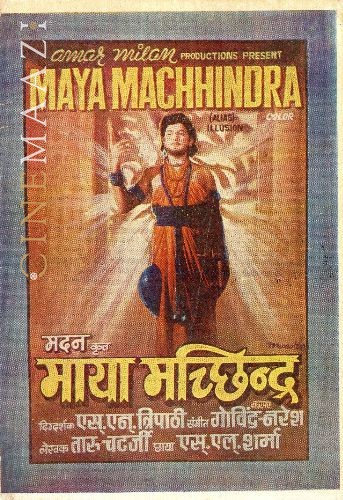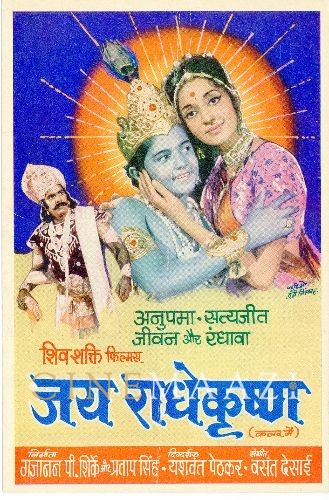Dalpat

Subscribe to read full article
This section is for paid subscribers only. Our subscription is only $37/- for one full year.
You get unlimited access to all paid section and features on the website with this subscription.
Not ready for a full subscription?
You can access this article for $2 , and have it saved to your account for one year.
- Primary Cinema: Hindi
Actor Dalpat (also credited as Kaka Dalpat, Dalpat Bhai and Dalpatram) featured in character roles in more than 70 films in the course of his career spanning the 1930s to the 1980s. In the initial years, he worked mainly with Wadia Movietone, followed by Basant Pictures. While the majority of films he acted in belong to the action adventure fantasy genre, he also featured in several devotional films. Some of the films he acted in include Diamond Queen (1940), Muqabala (1942), Jungle Princess (1942), Sher-E-Baghdad (1946), Toofani Tirandaz (1947), Ram Bhakta Hanuman (1948), Jungle Ka Jawahar (1953), Zimbo (1958), Zabak (1961), Magic Carpet (1964), Lav-Kush (1967), and Khilari (1968). Directors he worked with include Homi Wadia and Nanabhai Bhatt.
Among the earliest films he acted in were Jadui Danda/ Magic Wand (1935), the action fantasy genre film produced by Paramount Films and directed by Dwarka Khosla. It starred Master Shiraz, Champa, Bibi and Galbanu.
In 1937, he played a doctor in Toofani Tarzan/ The Storm of Tarzan (1937), an adventure film directed by Homi Wadia and starring John Cavas, Gulshan and Boman Shroff. This Wadia Movietone production revolved around a professor and his adopted daughter who embark on a peril-laden mission in their search for the professor’s son, daughter-in-law, and grandson. They catch the eye of an elusive but powerful man. Can the legend of Tarzan, defender of the jungle, be true? – this formed the film’s premise.
Diamond Queen (1940), the Wadia Movietone action adventure comedy film, saw him essay the character Dadu in this Fearless Nadia starrer. Set in Diamond Town where the lead actress Madhurika returns following five years of studies in Bombay, she goes on to combine forces with the dacoit Diler to deliver the town from the evil Kedarnath, while also advocating for women's literacy and independence. Critically acclaimed and commercially successful, it was dubbed “a thought-provoking film that enlightens as it entertains,” in a Filmindia editorial by Baburao Patel in 1940.
Wadia Movietone’s action drama Muqabala (1942), directed by Nanabhai Bhatt and Babubhai Mistry, saw him play a negative character Shivnath, who shoots dead the woman who rejected him, and imprisons her husband and twin daughter, while the other twin daughter is adopted by a rich man. The film was reportedly the first to feature a double role with Fearless Nadia essaying both characters.
After director Homi Wadia set up Basant Pictures, Dalpat featured in his devotional film Ram Bhakta Hanuman (1948). He played Shri Meghnath in this Homi Wadia directorial that starred Trilok Kapoor as Bhagwan Shri Ram and Sona Chatterjee as Devi Ma Sita ‘Janki’. The story, taken from an episode of Valmiki Ramayana, revolves around the abduction of Sita by Ravana, and Hanuman's support to Rama and Lakshman in the battle against Ravana.
In 1949, he acted in Basant Pictures’ Veer Ghatotkach, the mythological based on incidents from the epic Mahabharata. He played the character Shishupal in this Nanabhai Bhatt directorial, which starred Amarnath, Shree Bhagwan and Sona Chatterjee.
Homi Wadia’s adventure fantasy Aladdin Aur Jadui Chirag (1952) saw him feature alongside Mahipal, Meena Kumari and S N Tripathi in this musical adaptation of the tale from the Arabian Nights which follows the adventures of Aladdin and his finding of the magic lamp in the cave, and his love for the princess Badar.
Dalpat played the Sultan’s assist in the John Cawas-directed action adventure Baghdad Ka Jadu (1956) and a reformed crook in Homi Wadia’s adventure fantasy Hatimtai (1956) starring Shakila and Paidi Jairaj.
The Nanabhai Bhatt-directed Zimbo Comes To Town (1960) saw him play a doctor, while in Homi Wadia’s Char Dervesh (1964) he essayed Dervesh Shakir Abaad, followed by a character named Vikram Singh in Noor Mahal (1965).
Among the many devotional films he acted in are Rambhakta Hanuman (1969) in which he played Vibhishana, Shree Krishnarjun Yuddh (1971), Sampoorna Devi Darshan (1971), Shri Krishna Leela (1971), Maya Machhindra (1975), Jai Ambe Maa (1977) and Hari Darshan (1982).
-
Filmography (106)
SortRole
-
Toofani Takkar 1978
-
Jai Ambe Maa 1977
-

Maya Machhindra 1975
-
Maayaa Machhindra 1975
-
Rafoo Chakkar 1975
-

Jai Radhe Krishna 1974
-
Jai Hanumaan 1973
-
Shree Krishna Bhakti 1973
-
Beera Sheraa 1973
-

Sant Tulsidas 1972
-

Hari Darshan 1972
-







.jpg)



